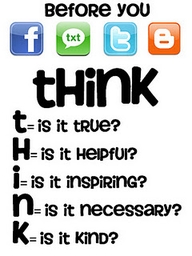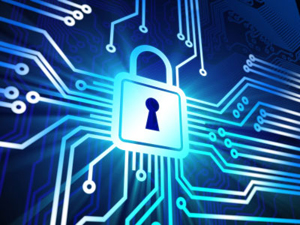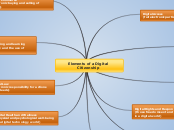Elements of a Digital Citizenship
Digital Access
(full electronic participation in society)

Technology users are not aware that not everyone has
same opportunities when it comes to technology. When working with technology, there should be equal digital rights and support access for everyone in the digital society. Digital exclusion makes it difficult to grow the society and the increasing use these tools. Users must help to provide and expend access to technology. This must be the goal of all digital citizens. Users must also keep in mind that others have limited access and that other resources may need to be provided to these limited users. They must be committed to make sure that no one is denied digital access.
Digital Communication
(electronic exchange of information)

The number one significant change within the digital revolution is a person's ability to communicate with others. Before the 21st century, communication was very limited. When the 21st century came, it boomed with a lot of communication platforms. This variety now found in communication includes e-mails, phones, and texting that helps to expand the digital community. This changed everything. Now people are now able to communicate and collaborate with just about anyone from anywhere at anytime. However, this huge expanse of communication has downsides as users are not taught how to make the appropriate decisions when face with these many different digital options.
Digital Etiquette
(electronic standards of conduct or procedure)

Technological users see this area as the most pressing problem when dealing with digital citizenship. They know inappropriate actions when they see it but people need to think before using technology. People have not learned digital etiquette or the appropriate conduct. People feel uneasy when talking about their digital etiquette to others. Rules, regulations, and technologic bans are created help to stop the inappropriate usage. Unfortunately, creating rules and policy is not enough. People must be taught how to become a responsible digital citizen in this new electronic society.
Digital Rights and Responsibilities
(those freedoms extend to everyone in a digital world)

There is a basic set of rights that extended and applies to every digital citizen. The right to privacy, free speech, etc. must be addressed, discussed, and understood in a digital world. Rights come with responsibilities that every users needs to uphold. Users must define how technology is to be used in an appropriate manner. These two areas have to work together for everyone to be productive.
Digital Security [Self-Protection]
(electronic precautions to guarantee safety)

In any society, there are individuals that cause crime. The same is true for a digital community. It is not enough to trust others in the community for ones own safety. There needs to be virus protection, backups of data, and surge control of our equipment in order to be quite safe. Responsible citizens must protect their information from outside forces that want to cause disruptions or harm.
Digital Commerce
(electronic buying and selling of goods)

Technology users must understand that a large share of the marketed economy is done electronically. Many legitimate and legal exchanges occur online. Buyers and sellers have to be aware of the issues that are associated with it. The mainstream availability of internet purchases have become a common place to many users. However, the equal amount of goods and services are in conflict with laws and morals of some countries have surfaced. These issues include illegal downloading, porn, and gambling. Users must also learn to be effective consumers in the new digital economy.
Digital Literacy
(process of teaching and learning about technology and the use of technology)

There is still a lot of technological infusion be done in the workplace. Schools have done great progress in this area. However, the focus needs to be renewed. People need to be taught about technology, its uses, and how to use it properly. New technologies have found its way into the workplace through videoconferencing, wikis, and blogs. In addition to this, workers in different jobs need immediate information (just in-time information). This process requires sophisticated searching and processing skills (information literacy). Learners must be taught how to learn in a digital society. They also need to know how to learn at anytime, anyplace, and anything they need to know. Learners need to learn technology quickly and correctly. Digital citizenship is involved in educating people in a new way with a high degree of information literacy skills.
Digital Law
(electronic responsibility for actions and deeds)

Digital law deals with ethics of technology within a society. The unethical usage of technology takes the form of crime and theft. However, the ethical usage is the direct opposite. It takes the form of abiding by the laws of the digital society. Users need to understand that stealing and causing damage to others work, property, or identity online is wrong and a crime. There are certain rules that users need to be aware of in an ethical society. The laws apply to everyone and anyone who works and/or plays online. Hacking information, downloading illegal music, plagiarizing, creating destructive worms, creating viruses and/or Trojan horses, sending spam, or stealing another's identity or property is all unethical. These things users should know are crimes and should be taught that these crimes hurt the digital society.
Digital Health and Wellness
(physical and psychological well-being in a digital technology world)

Eye safety, repetitive stress syndrome, and sound ergonomic practices are issues needed to be addressed in a new technological world. The issues, however, extends beyond the physical issues as there is also psychological issues. These psychological issues are starting to become prevalent. An example of these problems would be internet addiction. Users need to be taught the inherent dangers of technology. Digital citizenship includes this culture where technology users are taught to protect themselves through education and training.
Work Cited
EasyBib. Imagine Easy Solutions, n.d. Web. 14 Sept. 2016. <http://www.easybib.com/cite/view>;.
"Google Images." Google Images. Google, n.d. Web. 14 Sept. 2016. <https://images.google.com/?gws_rd=ssl>;.
Ribble, Mike. "Nine Elements." Digitalcitizenship. Go Daddy Custom Design Group, 2016. Web. 14 Sept. 2016 <http://www.digitalcitizenship.net/Nine_Elements.html>;.
